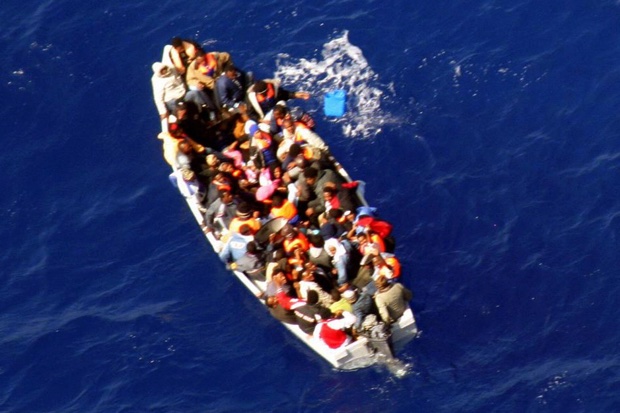As the leading article in The Spectator this week pointed out, thousands of people are fleeing war and anarchy in Africa and setting sail across the Mediterranean bound for Europe. The latest tragedy comes today, after a boat carrying between 500 and 700 migrants from Libya capsized. So far, only 28 people have been rescued.
Coaxed by traffickers who demand huge sums, refugees have been piling into rickety boats which often disintegrate en route. Aid groups, human rights activists, the pope and the EU itself all say the EU-funded rescue operation Triton is inadequate. Well, they’re right in a way, but they’re also missing the point. The real culprit isn’t Triton but the EU’s tragic asylum and immigration policy. Though it is designed to save people, it instead lures them to their death.
Before the establishment of Triton, Italy, which has the closest external border to Africa, buckled under the strain of its much-lauded rescue mission Mare Nostrum. Italians knew they were saving lives, but they also knew they were contributing to a vicious circle: the more people they helped, the more would come and the greater the strain placed on their struggling country.
The Dublin Regulation, central to the EU’s asylum and migration policy, is at the heart of this catastrophe, stipulating that the country of first arrival must take responsibility for the asylum claim. The inanity of this regulation comes into focus when you consider the Schengen open-border agreement and its implication in this context. For if Schengen did not exist, if it was not so easy to travel across Europe unnoticed and migrants would not be arriving in such swarms. The migrants are told that once they reach Italy, Europe is open to them.
Italy, Greece, Spain and Malta are inevitably the ‘countries of arrival’ because they occupy Europe’s closest external border to Africa. They are also the least equipped to deal with the influx of migrants. Reception centres for asylum seekers are squalid and funds are low but since ‘push backs’ are illegal, these countries have no choice but to take migrants in. They are then expected to process their claims, provide asylum seekers with at least temporary accommodation, and accept, on behalf of the EU, the financial burden which comes with these procedures, something which they are increasingly unwilling to do.
Instead the countries of arrival are turning a blind eye, leaving asylum seekers to make their way unobserved across Europe’s open borders to wealthier countries like Germany, Sweden and Finland. Even the UK, although it is outside the Schengen zone, is experiencing an influx of illegal immigrants as a result. The episode in Calais last year where hundreds of North Africans jumped onto a ferry bound for England, one of whom popped out of a woman’s car boot when she had parked outside her home in Kent, is just one fiasco. It would have been funny were it not so frustratingly serious.
At the other end of the spectrum, richer northern European countries are now choosing to ignore Dublin because of the humanitarian implications that come with adhering to it. Finland recently decided not to send immigrants back to countries of first entry anymore in the knowledge that these countries cannot cope. The situation is so confused now that Belgium was recently found guilty of human rights violations for adhering to Dublin by sending a group of asylum seekers back to Greece. The situation is becoming increasingly farcical.
The EU persists in pronouncing the Schengen agreement as its greatest achievement when in fact it is a disaster, because Europe has neither an EU external border guard fully-funded by EU money, nor a common asylum policy. If the EU really wanted Schengen to function properly then it would have also accepted that ‘the Mediterranean border is a European border’, as an exasperated Angelino Alfano, the Italian Interior Minister at the time, said in the wake of the Lampedusa crisis last year. Even more importantly, a law which fairly distributes asylum seekers and costs, with member states footing costs proportionate to their relative wealth, should be in place.
Unfortunately, Dublin and Schengen were dreamt up with no consideration of any possible consequences. Now, as a result of thoughtless policy making, we belong to a Europe where the mere mention of the term ‘burden sharing’ sends shudders down the spines of government officials. The 28 EU countries come with 28 different police and judicial systems and 28 different asylum policies not to mention the colourful spectrum of political views across the continent, the more extreme opinions born out of this and other similar situations. All of this makes any further harmonisation impossible. No country is going to agree to the EU dictating its asylum laws anymore.
It is a tragedy that EU policy over the last decade has led to asylum seekers being pushed around between countries at great expense to EU countries and to their own welfare. National governments are now wondering whether to adhere to the regulation or not, and whether to rescue their fellow human beings or not, to the point that nobody, not even those in genuine need, is getting any help. It is a circus and it is unsustainable. Meanwhile the European Commission is working hard on a ‘feasibility study’ into an EU border in the full knowledge that it is unfeasible.






Comments